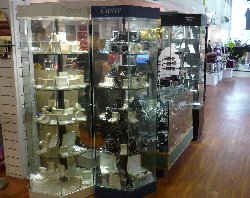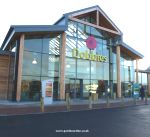Categories
Calendars
Guides
Reviews
Archive
Gallery
Articles
Ask Our Gardening Expert
GARDEN CENTRES UK
We have reviewed a range of garden centres all over the UK. We
looked at their plants, the facilities available, the cafes, the prices, disabled
facilities and much more. We took pictures of the good and the bad and in many cases
talked to the owners and managers. We hope these reviews help you select garden centres that suits your needs.
The number of reviews has now grown so large that this page groups garden
centres either by county (see right), city /town (see left) or by owner (see below). SEE LEFT FOR GARDEN CENTRES GROUPED BY REGION /
CITY
GARDEN CENTRES BY COUNTY BELOW
Buckinghamshire
London
- West
Surrey
Cheshire
Northamptonshire
Warwickshire
Cornwall
Northumberland / Tyne
Gloucestershire
Nottinghamshire
Wiltshire
Hertfordshire
Oxfordshire
Worcestershire
If an area is not underlined this is because we have not yet reviewed any
garden centres in that area at the moment. The number of garden centres will expand rapidly
over the next six months. If you want a list of garden centres by owner / company then click one of
the entries below.
Prior to the 1960s gardeners bought their plants mainly at nurseries. These were much
smaller concerns compared to the large garden centres of today. Often, the nurseries had
been in the same family for several generations and provided valuable local services to the
gardener. Only plants in season would be available for sale and plants "in pots" out of
season were a rarity. In the early 1960s, the Americans successfully developed the concept that containerised
plants could be sold all year round. British entrepreneurs latched onto this idea and
developed the principle here in Britain. The "garden centre" was born in the UK. From those early days garden centres have developed out of all recognition. Yes, some of
the family nurseries still exist and we applaud them for that. Some of the garden centres in
the UK are also still family owned, and congratulations to them as well.
The picture on the left is typical of some of the larger garden centres. At Bents garden centre they now have
indoor sales areas that include expensive jewellery.
These larger garden centres have clearly identified that many customers prefer
department-store like environments selling a massive amount of non-gardening goods along
side plants and gardening accessories. The trend setters in these large garden centres are Dobbies Garden Centres. Their new garden centres
are based on a template formula which Dobbies have now repeated into double numbers. The
"grand" entrance, the slick modern layout, the five year guarantee and the regimented and
easily maintained plants area.
The main player though in the UK garden centre market is easily Wyevale (renamed in July
2009 to The Garden Centre Group). With over 100
branches throughout the UK, they are number one. With so many garden centres they clearly
have a "formula" but this is not so evident to the customer as in the Dobbies Garden
Centres. In 2008 / 2009, Wyevale had a very rocky financial period and came close to
collapse. However, they managed to renegotiate their borrowing requirements with the banks
and their future is not quite so uncertain. Over the last 15 years, Christmas gifts, cards, trees and decorations have become big
business for the garden centres. Some transform November and December into a Christmas
wonderland of flashing lights and snow scenes. The reason for this is clear, Christmas is a
very poor time of the year for plant sales. Examine the efforts of the various types of garden centres at the October to December
Christmas period and one thing becomes very clear. As a rule of thumb, the larger
independent garden centres transform themselves into a Christmas Wonderland far better than
the Dobbies, Wyevale and Notcutts chains do. Christmas time is one of the key profit-making
periods for garden centres, and maybe the large independents are making the best job of it. For those curious about garden centres in the UK, some statistics provide an insight into
how this industry is progressing. First, and most startling, is that the top 3 garden centre
organisations (Wyevale (including Blooms), Notcutts and Dobbies (now owned by Tesco), have
just under 6% of the garden centre market in 2009. This is clear evidence that there is no
one dominant force in the garden centre industry. The total garden centre businesses in the UK are worth just over £4 billion in 2009. Up to April
2009 the industry was expanding rather than contracting in the face of the recession. Time
will tell if this continues into 2010 but the signs are looking good. In July 2010, Wyevale's changed its name to The Garden Centre Group. The most well known
garden centre name in the UK has now been lost forever. Wyevale's claim that this is a
reflection of the diversity of the garden centres taken over during the past few years. Whatever your garden centre preferences, we do hope you enjoy the huge garden centres now springing up.
But we also hope you appreciate the local advice which can only be given by smaller garden centres and nurseries.
& Wear)
West
Midlands
GARDEN CENTRES IN THE UK - A BRIEF HISTORY The mega-large, company owned garden centres of today typically have about 40% of their
floor area devoted to plants and gardening items. The remaining 60% of the floor area is
given over to gifts, cards, delicatessen, cafes and other non-gardening products and
services.
The mega-large, company owned garden centres of today typically have about 40% of their
floor area devoted to plants and gardening items. The remaining 60% of the floor area is
given over to gifts, cards, delicatessen, cafes and other non-gardening products and
services.

Dobbies Chesterfield Branch